During this time of year, we are all scrambling to grab the best Natural Cough Remedies. This post will help break down what you need to know when treating an upper respiratory illness. When addressing a cough, it’s important to understand why we develop them in the first place. Coughing is a helpful action by the body. When you become sick, viral or bacterial particles enter the body, and as all things on earth, their goal is to survive. Your body creates a range of different counter reactions to fight off these germs. One way is by producing phlegm and using it to encapsulate germs. Once the body has germs trapped within the mucous it has created, it will try to move this phlegm out of the body. The quickest and most effective way to remove this substance is by way of coughing. That is why when it comes to an acute upper respiratory condition, it’s important to focus on supporting the cough to remove phlegm rather than suppress it. Over the counter cough suppressants are popular because coughs are inconvenient and uncomfortable. However, suppressing the body’s healing actions can extend the life span of your illness. There is a time and place for suppressants as coughs can come to a point of being unbearable. However, this trend towards medicating every single minor discomfort comes with a cost. If we learn to support our body’s natural abilities in eliminating illness, we are more likely to get ahead of it. If we can get ahead of the germs by eliminating them more effectively, we may eliminate the need for suppression. The body knows what to do, and although there are always exceptions to the rule, understanding its mechanisms makes dealing with sickness so much easier.
* This post may include affiliate links. This means that products purchased from certain links will generate a small commission (At no extra cost to you). As always, I will only recommend brands that have passed my seal of approval and that I truly love. Thank you for supporting this little holistic space on the internet. *
* Disclaimer: This blog post is not intended as medical advice. Please seek medical care from your trusted health care practitioner. *
Now that we have a general understanding of what a coughs is, we can move onto how to support the lungs during an upper respiratory episode. The goal is to ensure a cough is “productive”. This means you want the cough to be moving out germs and phlegm. I keep a handful of natural remedies at home so that I am prepared when a cough comes about. The quicker you implement supportive remedies to the body, the quicker the body heals as a whole. There is also a reduced chance of germs festering in the lungs when you are quick to action. This could potentially reduce your chances of developing pneumonia or bronchitis as a result of the illness. That being said, always consult with your practitioner if you feel that things have progressed to infection. You can certainly support the body with natural remedies through an infection, but the lungs are vital to us. There is a time and place for conventional medicine. It’s particularly important to monitor for respiratory distress in children and elderly as they are most prone. Respiratory distress does not happen all the time but there are signs to watch out for. Some can include: breathing rate, color changes, grunting, retractions, sweating and wheezing. These could indicate that a person is working harder to breathe or not getting enough oxygen.

That being said, most coughs are easily treatable at home and there are a number of things you can do to support the body in this phase of healing. This support comes in a few forms. Some remedies help loosen mucous in the lungs so you can cough it out more easily. Other remedies are expectorants which means they help the cough in clearing the mucous out of your airway. Expectorants work by thinning and loosening secretions in the airway which results in a more productive cough. Lastly, there are remedies that support the immune system in general to work against the germs that your body is trying to physically expel. There are certainly a number of conventional cough remedies but I opt for natural remedies to avoid synthetic chemicals creating a heavier toxin load in the body. There are two methods I love to use the most. I even use these in conjunction with each other as they work in different ways. One is via herbal tinctures and the other is by targeted acute homeopathic remedies.
Herbal Tinctures
Herbs are such an effective way at supporting the body when it comes to acute illness. Did you know that conventional medicine actually mimics the scientific action of herbs to create pharmaceuticals? One example of this is the herb Star Anise. Star Anise is an incredibly supportive anti-viral herb because of a compound it contains called shikimic acid. Shikimic acid has been isolated and used in a conventional drug for influenza called Tamiflu because of it’s effectiveness observed in both nature and laboratories. Not only is it a powerful antiviral, but an anti-coagulant, anti-microbial, anti-thrombotic, and is known to fight cancer. There are essentially zero conventional pharmaceuticals on the market that don’t mimic or adopt compounds from nature.
The easiest and most potent way to take herbs internally is by way of a tincture. A tincture is a medicine made by dissolving the medicinal portions of an herb into a solvent such as alcohol or glycerin. Tinctures are easy to take because they come in the form of liquid. They can be taken straight via a dropper or added to a drink of some type. They are especially easy to give to children, pending they are safely dosed and appropriate for their age.
One of my very favorite herbs for coughs and acute upper respiratory illness is a plant called mullein leaf. It is a common herb and you can even grow it in your own backyard. Mullein is well known for it’s supportive lung properties. It is an expectorant as it helps loosen mucous for the body to eliminate easier. It also reduces irritation during an episode and can help rebuild lung tissue. It’s even been known to wade off infection like pneumonia and bronchitis. One of my favorite sources of mullein leaf in tincture form is Earthley’s Cough-B-Gone tincture. You can also purchase a children’s option that is made in glycerin rather than alcohol.
There are also blended tinctures on the market that work synergistically to target this as well and they often work better as a blend. This is due specifically to their synergistic action. A synergistic effect means the cooperation of two or more substances (in this case herbs) produce a combined effect greater than the sum of their separate effects. Essentially, they make each other more powerful when given together.
One of my very favorite synergistic tinctures to give to my family (including my children) during a cough is called The Lung Shield by Wild Wholistics. I always have this targeted respiratory blend on hand because you never know when you may need it and you don’t want to be without it when you do. It contains a powerful blend of herbs and mushrooms that help support the immune system and act as an expectorant. This tincture is made using glycerin rather than alcohol making it appropriate for children to use.
The Lung shield includes ingredients such as Star anise, white and red pine needles. All of these contain high amounts of shikimic acid, which as mentioned above is a potent anti-viral. But in addition to that, shikimic acid also acts as an expectorant to discharge mucous in the lungs and helps to fight off infection. It also contains mullein leaf. As mentioned above, Mullein leaf has been used historically for coughs as it is both a powerful expectorant but it also helps to relieve irritation during a cough. Irritation and discomfort is one major reason people reach for suppressants, so its helpful to reduce discomfort if possible. The creators of Wild Wholistics share my love for mullein leaf and here they explain the incredible benefits it holds:
Mullein leaf is a go-to herb for respiratory ailments and lung issues, including asthma, bronchitis, impending respiratory infection, and lung irritation. Mullein relieves irritation in both infection and chronic cases, helping people take deeper breaths, and may even repair lung tissue.
The Lung Shield contains two types of medicinal mushrooms: Cordyceps and Reishi. To begin, mushrooms are something I reach for when illness hits because they are immune modulators. Immune Modulation means the immune system is brought to where it needs to be to fight infection and work in balance with your body. We often hear of immune stimulants which, as their name suggests, stimulate the immune system into overdrive to help ward off invaders. This can be beneficial, however, this can actually be too stimulating for some people or even cause cytokine storm to develop in serious cases. I often reach for mushrooms to modulate the immune system both preventatively and acutely when the body is fighting something. They keep the immune system working effectively without pushing too far. You also benefit greatly from immune modulators following an illness because they can help calm any autoimmune reactions or aggravated responses from the body.
Cordyceps is found to increase stamina and mental energy which are two things depleted by a lingering cough. It also specifically supports respiratory function and oxygen utilization. Reishi has been used as a lung tonic for thousands of years. It helps support the overall structure of the lungs and strengthens respiratory function. Reishi also reduces inflammation and pain while enhancing liver function and protecting the heart. As you can see, these two mushrooms add a lot of important mechanics when it comes to healing a cough.
Lastly, I wanted to touch on the remaining two herbs found in the Lung shield: Schisandra berry and thyme leaf. Schisandra berry is an adaptogenic herb. Adaptogens are used in herbal medicine for the stabilization of physical processes and promote homeostasis. They help the body adapt to stressors of all kinds. Each type of adaptogen has its own set of unique properties and benefits. Schisandra berry has an affinity for strengthening the lungs during times of physical stress (upper respiratory cough) and its harmonizing effect helps the body retain energy during illness. Thyme Leaf is known as a very powerful remedy for infections of all kinds, but especially in the lungs and digestive tract. It can help to prevent or treat any festering infection in the respiratory tract or the lungs.
As an overview, here are the key benefits of the Lung Shield tincture:
- helps strengthen respiratory function and structure
- helps reduce susceptibility to repeat infections like pneumonia and bronchitis
- a powerful remedy for infections particularly in the lungs and digestive tract
- helps decrease inflammation on lungs and respiratory tract
- anti-bacterial, anti-fungal, anti-viral
- reduces fatigue
- modulates the immune system
- improves red blood cells
- dries and drains mucous
- opens up airways and improves oxygen utilization
- reduces histamine and mucous
- soothes irritation and spasms
- rebuilds and repairs lung tissue
- vitamin C infusion
- high in anti-viral shikimic acid
- a powerful source of vitamins, minerals and antioxidants
You can use the lung shield regularly to enhance lung function, rebuild and repair damaged lung tissues and to prevent repeat infections such as pneumonia or bronchitis. This is especially important following an upper respiratory infection where some repair may be needed. It will rebuild, repair, modulate the immune response and prevent recurring issues all at once. As I’ve already mentioned, it’s also important to take during acute illness. I love having this blend on hand to ensure we support a cough and prevent anything from festering in the lungs or turning into an infection. In this case, take as needed or whenever your lungs require additional support.
Some other times I have found this blend helpful is during times of high air pollution. Home renovations are known for particulate matter becoming quite high within a home. You could also experience compromised lung function from environmental pollution such as nearby forest fires causing poor air quality. Reference my post on how to purify the air inside your home to support the lungs in these instances. Having cleaner indoor air can even be a preventative supportive measure for coughs as it keeps the lungs in strong shape and better able to fight off acute respiratory illness or infection.
The suggested use of this herbal tincture as per Wild Wholistics is as follows:
* Adults take 20 drops, approximately 1 dropper up to 4 times a day if needed or as per the advice of their doctor.
** Kids take 1 drop per 5lb of body weight up to 4 times a day if needed or as per the advice of their doctor.
*** You can take it directly on the tongue or mix with water. Do not put in hot drink as this will kill the enzymes. Shake well before use.
If you want to stock a bottle or two of Lung Shield in your medicine cabinet, you can grab it HERE. The owners of Wild Wholistics and creators of this wonderful line of plant medicines have offered THV readers an exclusive discount. You can use discount code THV10 at discount to help save a little. Standard shipping within the US and Canada is free for orders over $100.
Homeopathic Medicine
The second natural remedy for coughs that I want to discuss is in the form of homeopathic medicine. This is an alternative healing modality that is hard to grasp for many but I will try to explain as simply as possible. It can be helpful to consult a registered homeopath, but homeopathy can also be administered and practiced at home if you equip yourself with some basic knowledge. Many use the terms holistic medicine and homeopathic medicine interchangeably but that isn’t correct. Homeopathic medicine is its own branch of medicine and healing WITHIN the realm of holistic health. You may have seen little tubes or vials of tiny white sugar pellets in health food stores. These are homeopathic remedies, and the antidotes that homeopathy hangs its hat on. The most intriguing factor, beyond the fact that this medicine works, is its affordability. Homeopathy’s low cost makes it accessible to many.
Homeopathic medicine is a long standing form of medicine that was created in 1796 by Physician Samuel Hahnemann. It is rooted in the belief that the body is capable of curing itself. This is, in my opinion, a valid statement as our body’s are manufactured to induce healing responses to foreign invaders or illness. It holds the belief that the symptoms you present are the body’s healing reactions. Coughing is a perfect example, as it’s the body’s response to a foreign invader (either a virus or bacteria). The cough itself is not the issue, the invader is. In fact, the cough is the healing reaction or response to these invaders and is the action a body produces.
Many scoff at this form of medicine because they lack proper education on the topic. Homeopathy has successfully treated many conditions, both acute and chronic. In fact, homeopathy had a 98% rate of risk reduction during the deadly Spanish Flu of 1918, compared to the 30% mortality rate of those patients treated with western allopathic medicine.
In Homeopathy “like cures like”. It uses highly diluted amounts of natural substances, which, at higher amounts may cause the very disease or symptom you are trying to treat. In miniscule amounts, these substances induce a healing response from the body and assist it in curing itself. The tricky part of homeopathy is matching the right remedy to the right symptom. Homeopaths rarely look at a specific diagnosis to determine what to give a patient. They prefer to look at the symptoms and match the remedy solely on that. For those who want to try and match a remedy themselves at home, there are many charts and lists available for you. I personally love referencing Her Homeopathy Blog as she has a plethora of resources on a variety of ailments. Simply use the search bar in her website to find the topic you need some matching advice on. You can find her comprehensive post on matching remedy’s for coughs HERE.

When it comes to homeopathic remedies, the top matches we have used in our home have been Antimonium Tart (for wet coughs that are hard to bring up), Drosera (for dry coughs) and pulsatilla (dry during the day but productive at night). That being said, it’s important to match the remedy specific to you and your current symptoms. This can look different for everyone and for different illnesses. That is why I recommend having a general homeopathy kit on hand at home. A kit like this contains the most common remedies for a range of ailments. I pull it out every single time someone comes down with an illness or experiences a set of symptoms in our home. I really love the Ollois Homeopathic Home Kit which comes with 20 commonly used remedies. Though it doesn’t contain a wide enough array for coughs that I would like. I started out with homeopathy by purchasing a basic kit and familiarizing myself with various remedies. Over time I have grown this collection when I would match a specific remedy. You can always find a plethora of remedies in single vial form. I love both Ollois and Boiron Homeopathy for this. Boiron doesn’t carry many basic kits but they are one of my favorite companies for grabbing a remedy quickly as you can find them in most health food stores or on amazon next day delivery. They have an Amazon page dedicated to Cough and Throat Conditions so you can peruse the single remedies indicated.
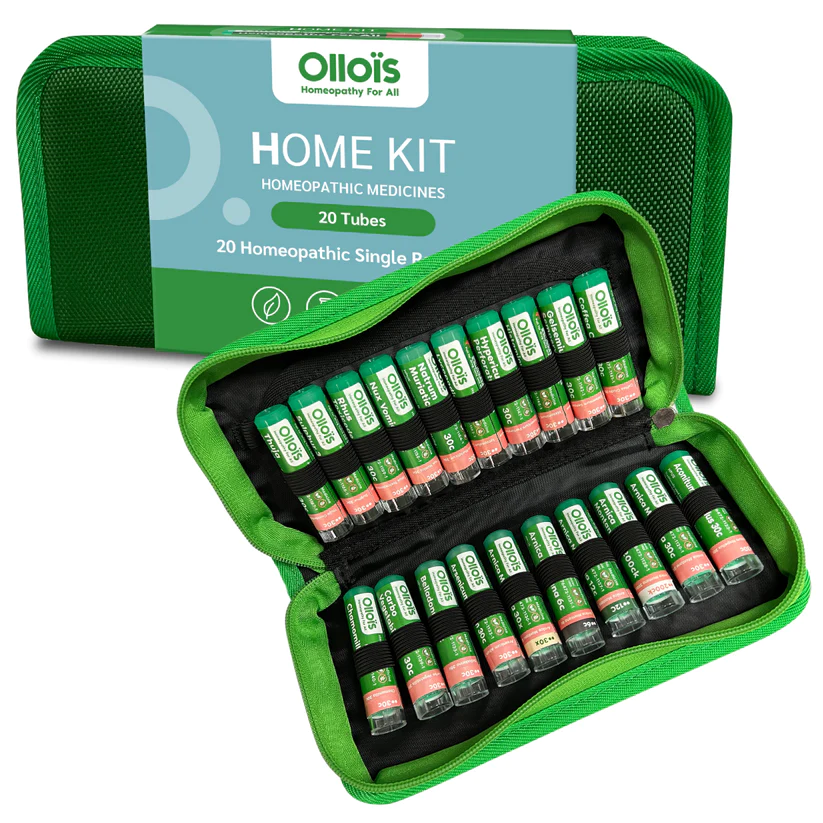
You can also find some combination medicines from certain homeopathic companies such as Chestal Cough Syrup by Boiron. These can be helpful when its difficult to match a remedy yourself as they contain a combination of homeopathic remedies specific to cough. Matching a single remedy specific to your symptoms is often more effective, however, sometimes a full symptom picture can be difficult to distinguish and relief may be needed fast. I usually reach for something like this if a little one is uncomfortable with lots of coughing (especially if it’s disrupting sleep at night) and I haven’t been able to match their remedy just yet.
Castor Oil Packs over the Chest
Castor oil packs are a longstanding wellness tool that you use externally to influence the internal environment. Castor oil has been used over the abdomen to influence bowel movements, liver function and hormonal health. It has also been used over the throat to support thyroid glands. It carries many uses but it can also be placed over the chest to help break up and move mucous along. This will help create a more productive cough and allow the body to move the mucous out more easily.
A castor oil pack is a cloth soaked in castor oil and it can then be placed on the chest to relieve congestion and cough. You can make your own DIY castor oil pack by:
- Take a piece of flannel cloth and cutting large pieces into two or three layers
- Soak a bit of castor oil on one side of the cloth layers
- Place the cloth over the desired area (in the case of cough, would be the chest)
- Cover the cloth with a plastic sheet to protect clothing as Castor oil is staining and sticky
- Leave the pack on for 20-60 minutes
Additionally, you could add an EMF free heating pad or hot water bottle over. However, if using the DIY method with a plastic covering, I would advise not placing heat over this. Alternatively, I really love the Queen of Thrones Castor Oil Packs that are constructed to have no mess, can be tied around the body so you can get up and move, and are reusable. I often recommend Queen of Thrones and it is what I personally use because their manufacturing is beyond other brands. I have tried other packs only to find that they weren’t as mess free as intended. Queen of Thrones has a number of different options for Castor Oil Pack sizes including one for Children. In the case of coughs and using one over the chest, I prefer using the Pelvis and Hip Pack as its wider in size.
I also recommend the Queen of Thrones Organic Castor Oil because it is organic, hexane free and stored in a glass bottle. Because castor oil is cathartic, it will absorb plastic particles if stored in a plastic bottle. You don’t want your body to absorb plastic particles during a castor oil pack session.
Nebulizers
This is another wellness tool that is used in both holistic and conventional medicine to address coughing and chest congestion. A nebulizer creates a fine mist from the liquid added to it’s cartridge and delivers these particles directly to the lungs via a mask or mouthpiece connected to the machine. The liquid is typically just saline which can help break up mucous and contaminants in the lungs. Some also use other medicated types of liquid to deliver a different type of support to the respiratory system. There are a variety of different liquid options such as hydrogen peroxide, hypochlorous acid, colloidal silver etc. Choosing one of these would be based on what condition or symptoms one has.
A nebulizer will not necessarily treat the condition on its own but it is a helpful support during acute upper respiratory illness. It often helps reduce inflammation and open up airways. It can be especially beneficial to those who have pre-existing lung conditions such as asthma or COPD and end up catching an upper respiratory illness. Once administered, a nebulizer can help reduce excessive coughing, chest tightness, wheezing, or shortness of breath.
There are many different nebulizers on the market, some are very expensive. Unless you have a doctor prescribed nebulizer for a specific reason, I opt for these two more reasonable options from Amazon. I love this Nebulizer as it comes with both the mask and mouthpiece option (pictured on the left below). I also love the convenience of this Portable Nebulizer as it doesn’t require you to sit in one spot with the machine or have any tube connections that tangle (pictured on the right below).
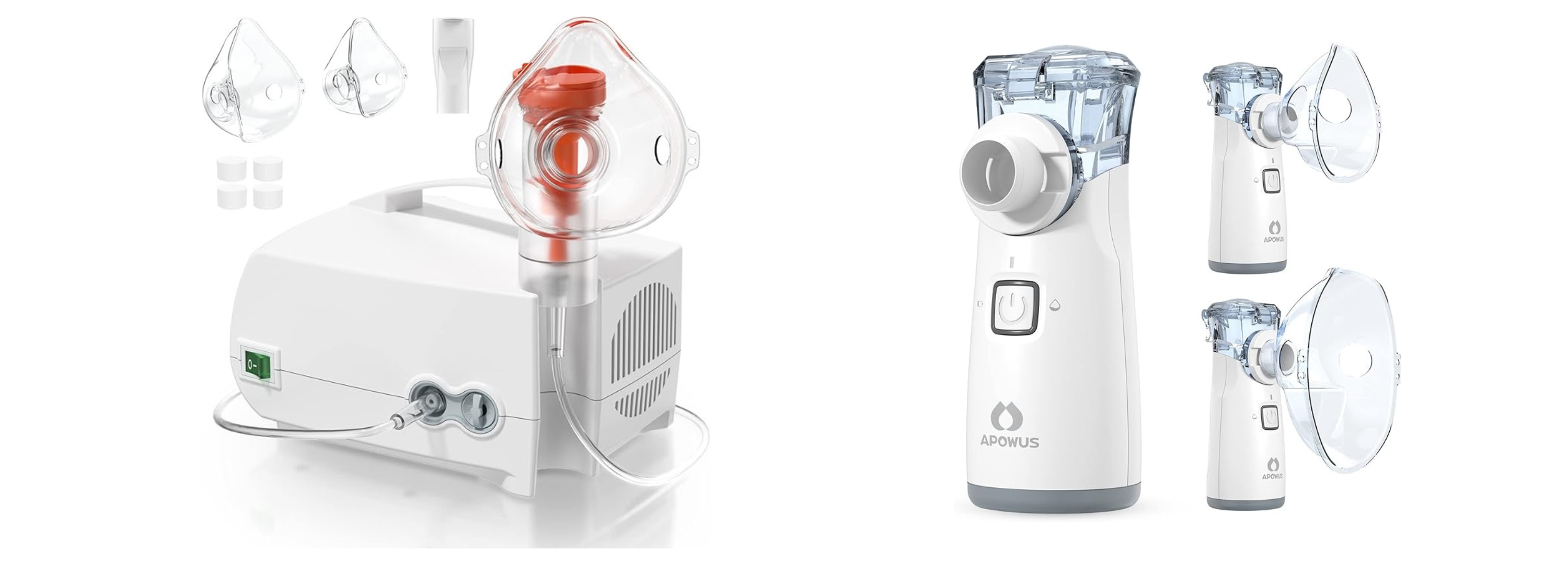
Essential Oils
There are a number of Essential Oils that have specific properties from the plant they’ve been extracted from that would assist with a cough. They can range in terms of being expectorants, anti-sposmadics, anti-viral, anti-microbial and anti-bacterial. The easiest way to use essential oils for a cough is by diffusing them. Diffusing oils releases the plant medicine into the air via tiny water droplets. These are then breathed in at small amounts. You don’t want to ingest or apply an essential oil undilted directly to the skin as they are incredibly potent and have a high likelihood of causing a reaction.
Children are most susceptible to reactions from essential oils. You have to dilute oils more for them and there are certain oils you can’t use on them. Many of the essential oils indicated for coughing contain a constituent called 1,8 cineole. This constituent can serve as a great tool for coughing in adults but can create difficulty and shallow breathing in small children. When it comes to kids and coughing I only use lemon and tea tree essential oils in a diffuser. These two oils offer immune boosting properties that will help alleviate a cough quicker. For adults you can use the following essential oils:
- Eucalyptus essential oil: eucalyptus is recognized as one of the most effective essential oils in treating respiratory conditions including pharyngitis, bronchitis and sinusitis. It has been well studied for it’s immune boosting effects and the ability to fight off bacteria. You can diffuse this oil or add it to a portable essential oil aroma inhaler. You can also mix it in with some epsom salts and add to your bath water. Please mix essential oils with the salts before adding to the bath water. Essential oils are hydrophobic which means they require a carrier to fully blend into the water, otherwise they will sit as droplets on top and potentially cause irritation of the skin.
- Rosemary essential oil: Rosemary oil helps reduce cough but relaxing the muscles in your trachea. You can add some rosemary to a carrier oil to rub on your chest, or inhale via a diffuser or a portable essential oil aroma inhaler.
- Thyme essential oil: Studies have found that thyme oil can be used as an anti-microbial agent which supports respiratory conditions. You can diffuse thyme in a diffuser or portable essential oil aroma inhalers.
- Peppermint essential oil: contains the constituent menthol. When inhaled, many have claimed they feel symptoms lessen. It has been said to help reduce congestion which is a component of a cough. You can diffuse peppermint in a diffuser or a portable essential oil aroma inhaler.
- Lavender essential oil: is especially great for those who are experiencing a cough but also have asthma. Lavender oil has been shown to inhibit airway resistance caused by bronchial asthma. You can diffuse lavender oil, add it to a carrier oil and rub on your chest or even blend with epsom bath salts and relax in a warm bath.
- Bergamot or Cypress essential oil: Both bergamot and cypress essential oils contain the constituent camphene. Camphene helped reduce respiratory conditions when inhaled. Camphene works by reducing respiratory tract fluid. You can add these to a diffuser, a portable essential oil aroma inhaler or add them to epsom bath salts and enjoy in a relaxing warm bath.
There are plenty of other essential oils that are indicated for coughs but these are some of my very favorites. You could also reach for oils that are supportive to the immune system. When choosing an essential oil you want to ensure that you’re not purchasing synthetic fragrance oils. There are many “essential oils” on the market that state they are “pure” but are not. Ensure you are purchasing a pure essential oil by reading the ingredient label. There should only be one ingredient and that would be the essential oil itself. I really love the Breathe Easy Set from Plant Therapy which contains oils that support coughing as well as the immune system together.
Plant Therapy Essential Oils are more affordable and still hold higher quality standards.
Honey & Propolis
When you think about a cough or a cold, the first remedy that always comes to mind is generally honey. Honey is a great option for many families due to its low cost making it financially accessible. Not to mention, it has a long list of health benefits and has been well studied when it comes to coughs. One study followed Children with upper respiratory tract infections and gave them 2 Tbsp. of honey at night. 1 in 5 Children showed a significant decrease in night time coughing and an increase in sleep quality. The same study found that honey was equally as effective as common cough suppressant ingredient, dextromethorphan. I suggest keeping a jar of raw organic honey in your pantry at all times. I especially love this Superfood Honey from Beekeeper’s Naturals that includes propolis, royal jelly, and bee pollen for extra immune support and antioxidants. I keep a jar of this around for when acute illness strikes.

But honey isn’t the only immune supportive super food that our friendly bees whip up for us. Propolis, also known as ‘bee glue’, is a resinous mixture produced by bees when they mix saliva, beeswax and pollen/exudate from tree buds, sap flows and other botanical sources. Bees create this to protect their hive from invasive germs. Humans can use it to support immune systems, soothe scratchy throats, combat free radical damage in the body, and feed the good bacteria in the gut. Propolis is anti-inflammatory, anti-oxidant, anti-cancer, anti-bacterial, and also holds wound-healing qualities. These benefits are all due to chemical compounds or antioxidants called flavonoids. Propolis can be applies externally and ingested internally for a wide range of ailments. It is especially helpful when it comes to the immune system and cold and flu symptoms like coughing. Propolis can be taken as a preventative measure during cold and flu season to boost the immune system. It’s also incredibly effective as an acute natural remedy. Propolis is considered a natural antibiotic that prevents cell division of bacteria and breaks down bacterial walls.
Propolis is extremely effective at treating a lingering or prolonged cough. It is indicated for upper respiratory infections, sinusitis, pharyngitis or sore throat, complications of respiratory disease, some types of bronchitis and more. I personally keep bottles of propolis spray as a daily immune support for our family. I also keep some of Beekeeper’s Naturals Cough syrup and cough lozenges to help soothe irritation during pesky coughs and colds. The best part about products like honey and propolis is their sweet and pleasant taste. Kids are more likely to take full doses of things they enjoy the taste of.
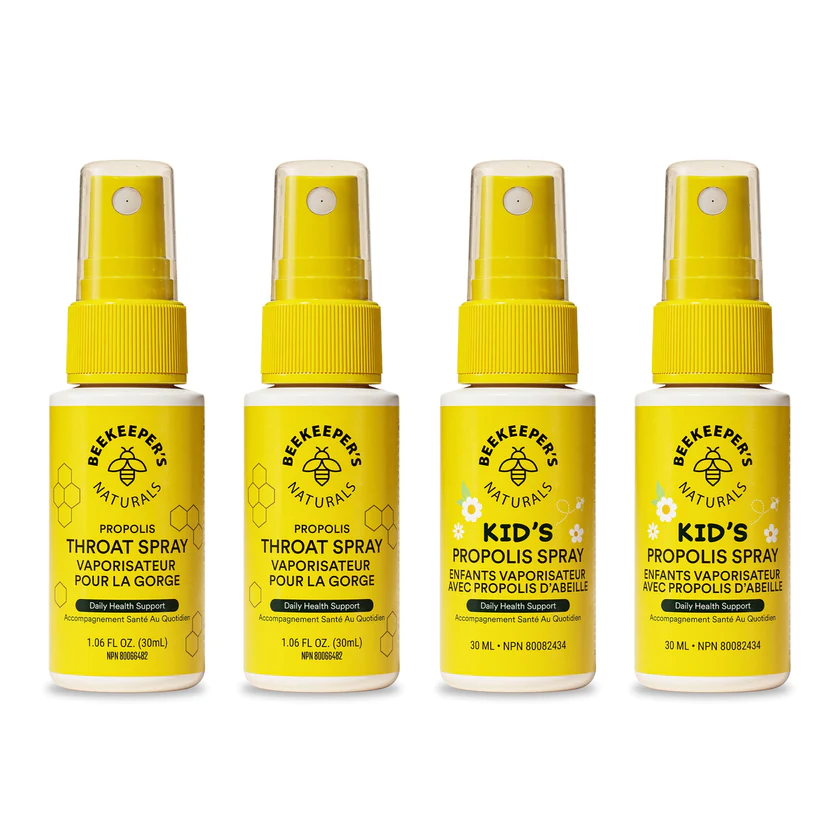
Natural Cough Syrups
If you’ve been dealing with a pesky respiratory illness and are needing some relief, a natural cough syrup may be a supportive and comforting addition to your arsenal. Conventional over the counter syrups are generally loaded with chemicals that will overburden your system. They are also suppressants that may alleviate discomfort temporarily but will extend the life of the virus by halting the body’s natural healing response. That is why reaching for a natural alternative is a great middle ground. They often use different herbal preparations, suspended homeopathic remedies and soothing throat coating ingredients like honey. There are a number of different options I love and I’ll walk you through my personal favorites that I’ve found to be most effective.
Organic Olivia’s HerbalTussin Cough Syrup
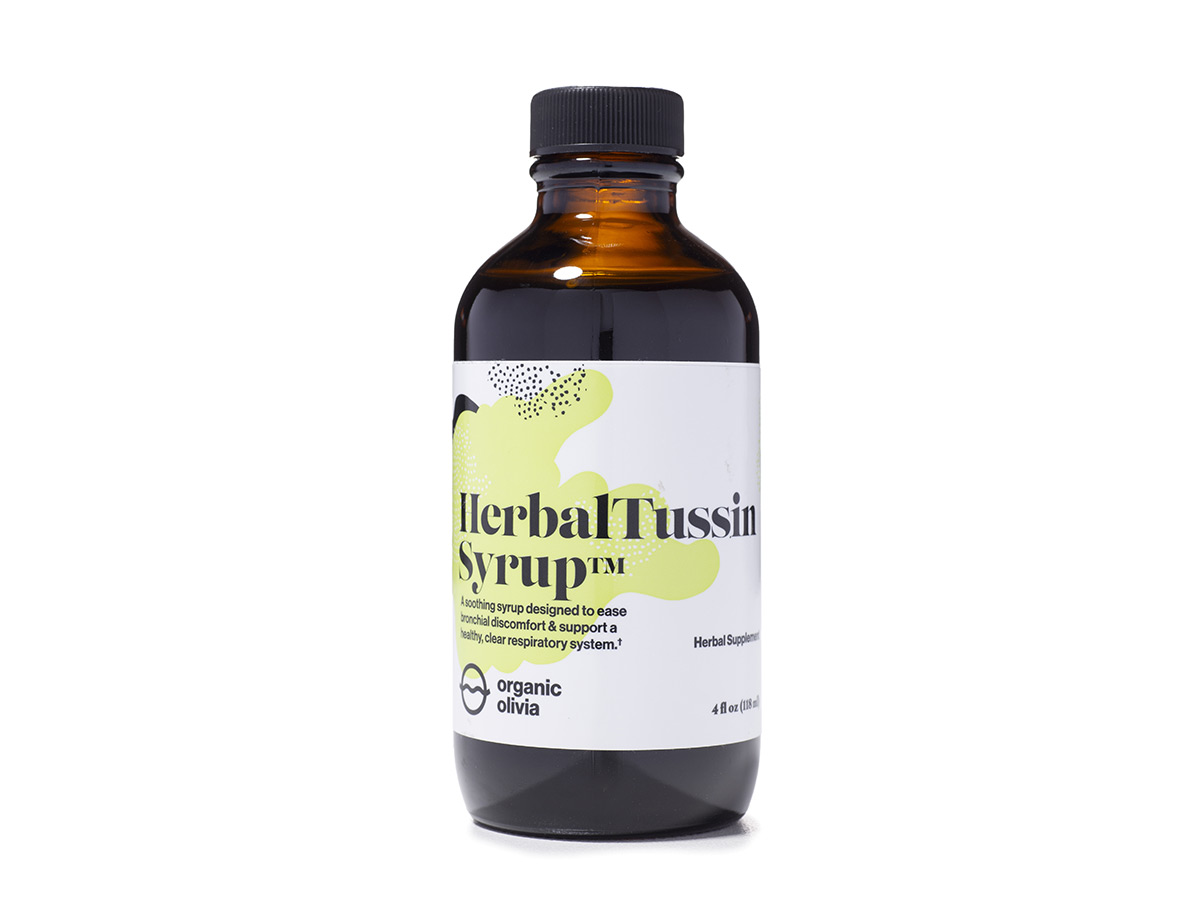
HerbalTussin is a syrup created by one of my favourite herbalists, Organic Olivia. She has an entire line of herbal remedies that she has blended with her vast knowledge of herbal medicine. This syrup will ease discomfort in the chest while also supporting the body to clear the respiratory system. It will not suppress the system which is key to ensuring a swift recovery from respiratory illness. It contains clearing herbs like Osha and Ginger to ensure bronchial health. She has deemed this cough syrup safe for both Children and Adults which makes it a great addition to any herbal medicine cabinet.
While you peruse Organic Olivia’s beautifully curated herbal apothecary, have a peek at another herbal tincture I love for the respiratory system called Microbiome Guard. It’s a lung support formula designed to keep you breathing easy with a blend of herbs that help to maintain balance within both the gut and lung microbiome. These two powerhouse herbal formulas would be a great duo to support the lungs during an acute respiratory illness.
Beekeeper Naturals Day Time Cough Syrup
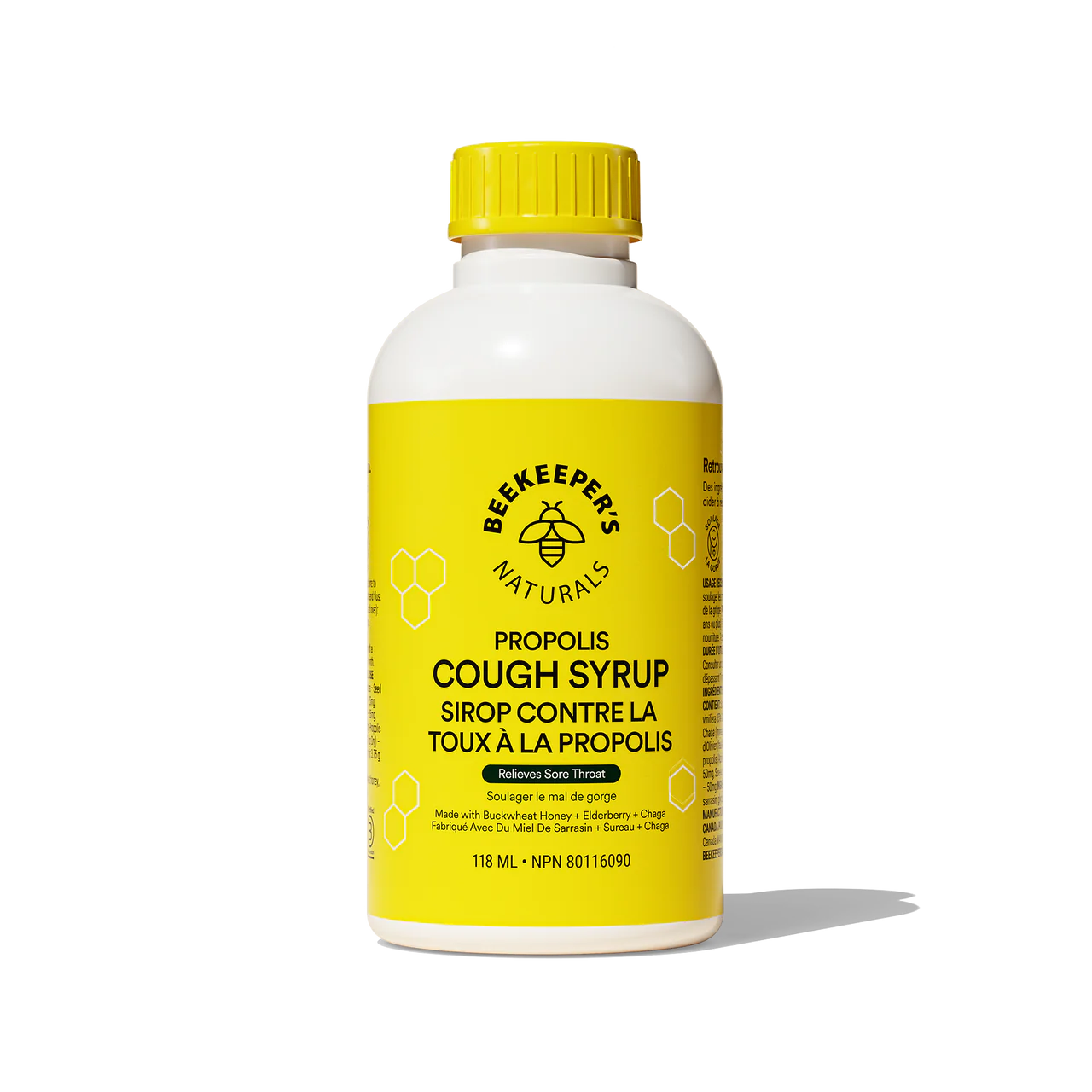
Beekeeper Naturals has a handful of specialized products outside of their propolis and honey. One being this propolis containing cough syrup that includes soothing buckwheat honey, immune boosting elderberry and immune modulating Chaga mushrooms. This syrup also helps relieve sore throats thanks to the honey and propolis making it a good option if you’re suffering from both a cough and pharyngitis. This cough syrup is specifically indicated for adult 18 years of age and up.
Boiron Homeopathic Cough Syrup (Chestal/Stodal)
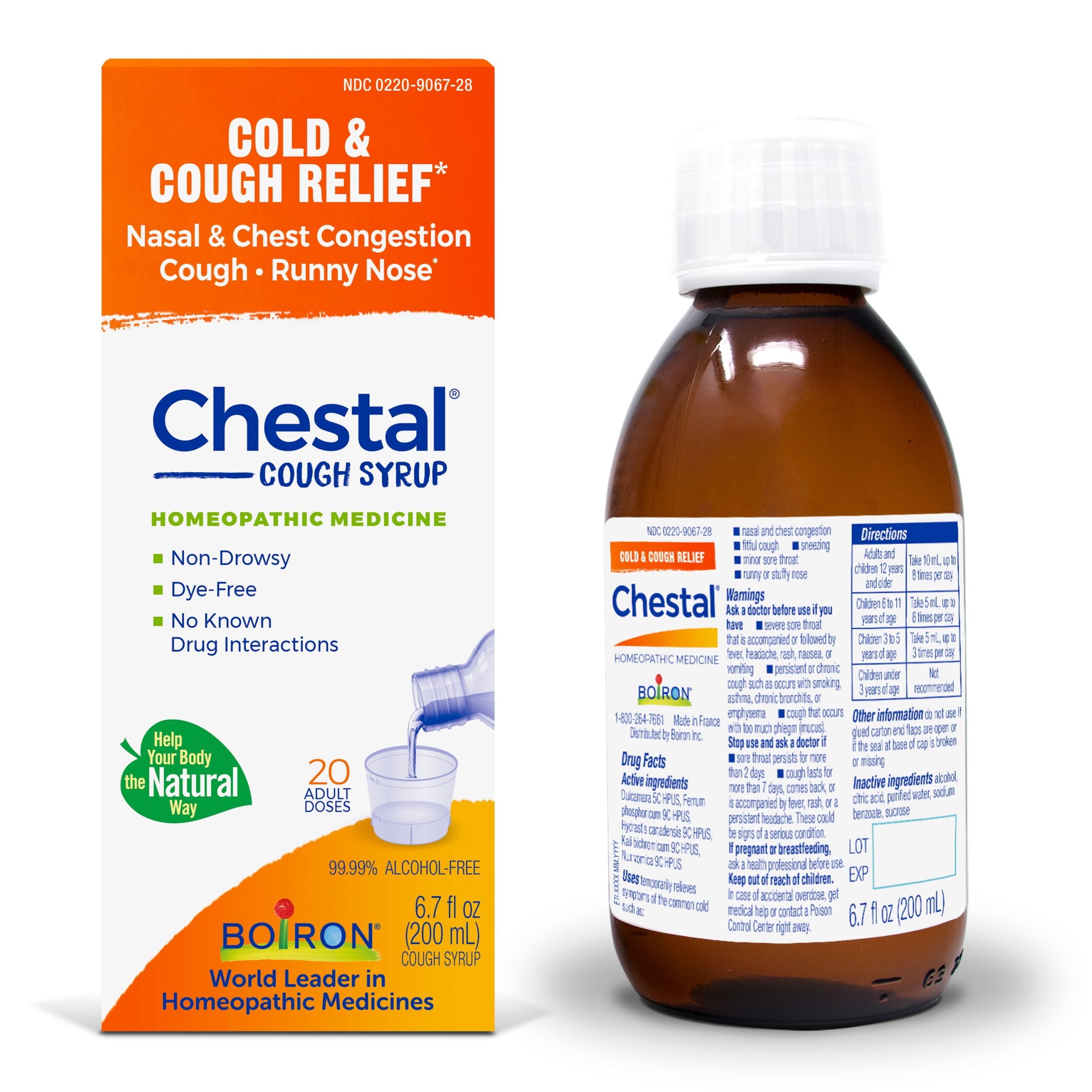
Lastly, I really love the homeopathic cough syrup by Boiron. This contains a suspension blend of targeted homeopathic remedies specifically for congestion and cough. This product is called Chestal in the United States and Stodal in Canada. I always prefer to try and get a specific picture of symptoms and match to a single remedy when it comes to homeopathy. However, sometimes these blended remedies can be helpful when you aren’t sure what remedy to match a situation or if a symptom profile is unclear. If I have already matched the right remedy to the situation I tend to reach for a non-homeopathic cough syrup to compliment that remedy instead.
Between these three cough syrup options, you’re sure to find one that your family loves.
If you inevitably find yourself with a cough this season, it can be very helpful to have some of these tools and remedies on hand to ensure you support your body through it’s healing process. Many of these remedies are quite versatile and their benefits extend across more than just coughs. I love to keep my holistic medicine cabinet stocked up on these staples to ensure I have all the tools available to me when needed and I’m not having to rush out to stores or wait on online shipping when someone in my home is sick.
The goal is not to avoid illness but to understand the body and support it through it’s healing process.
** PIN this post to keep it saved **
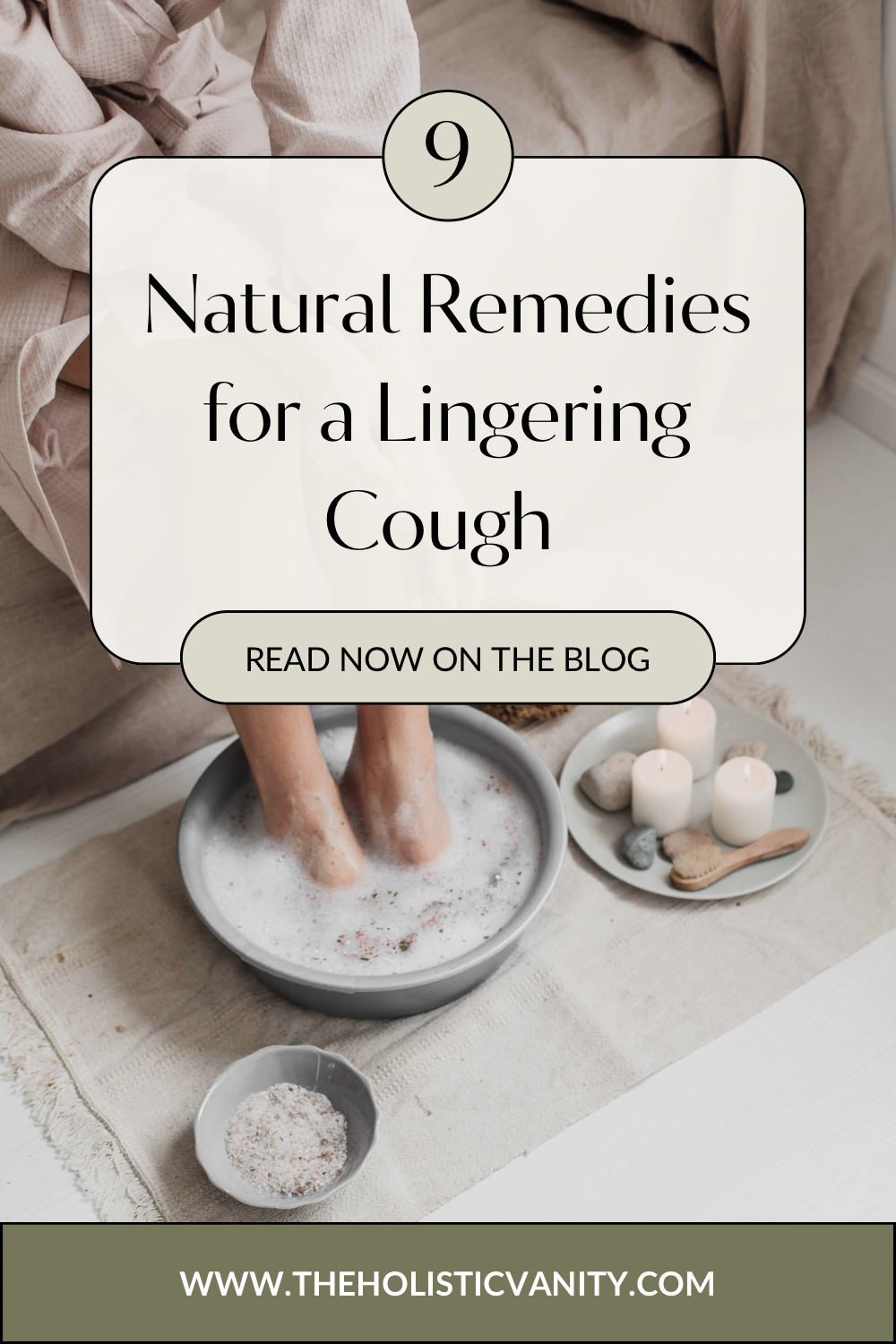

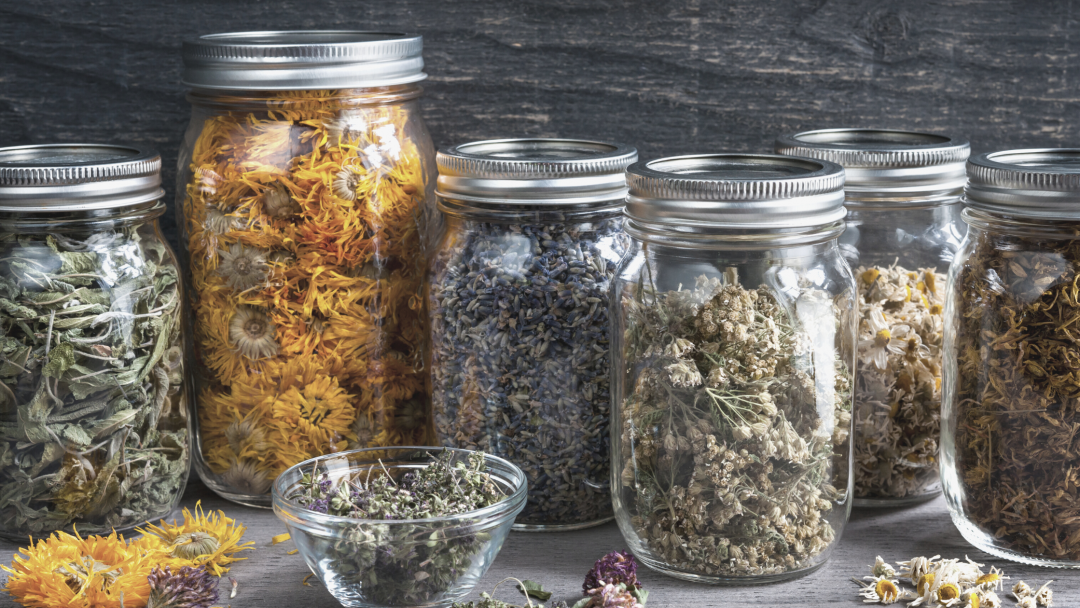

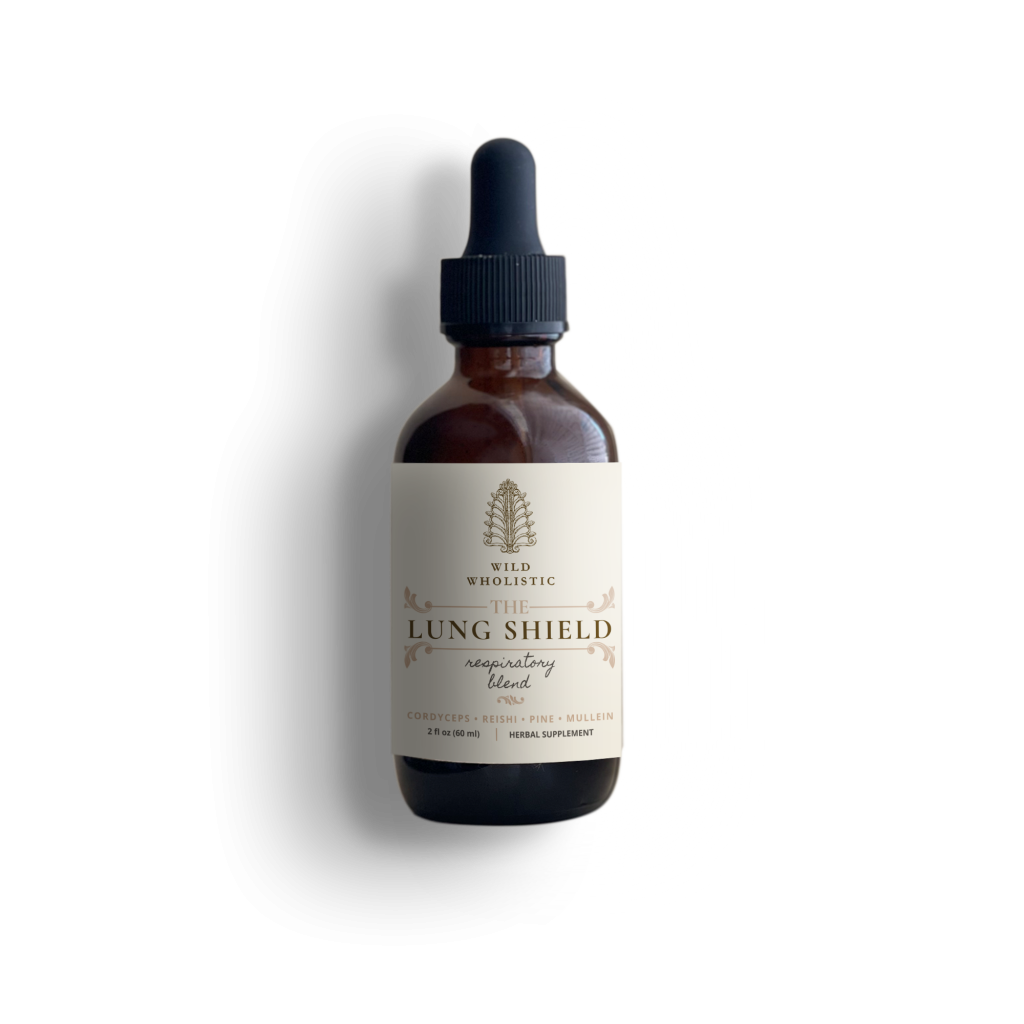
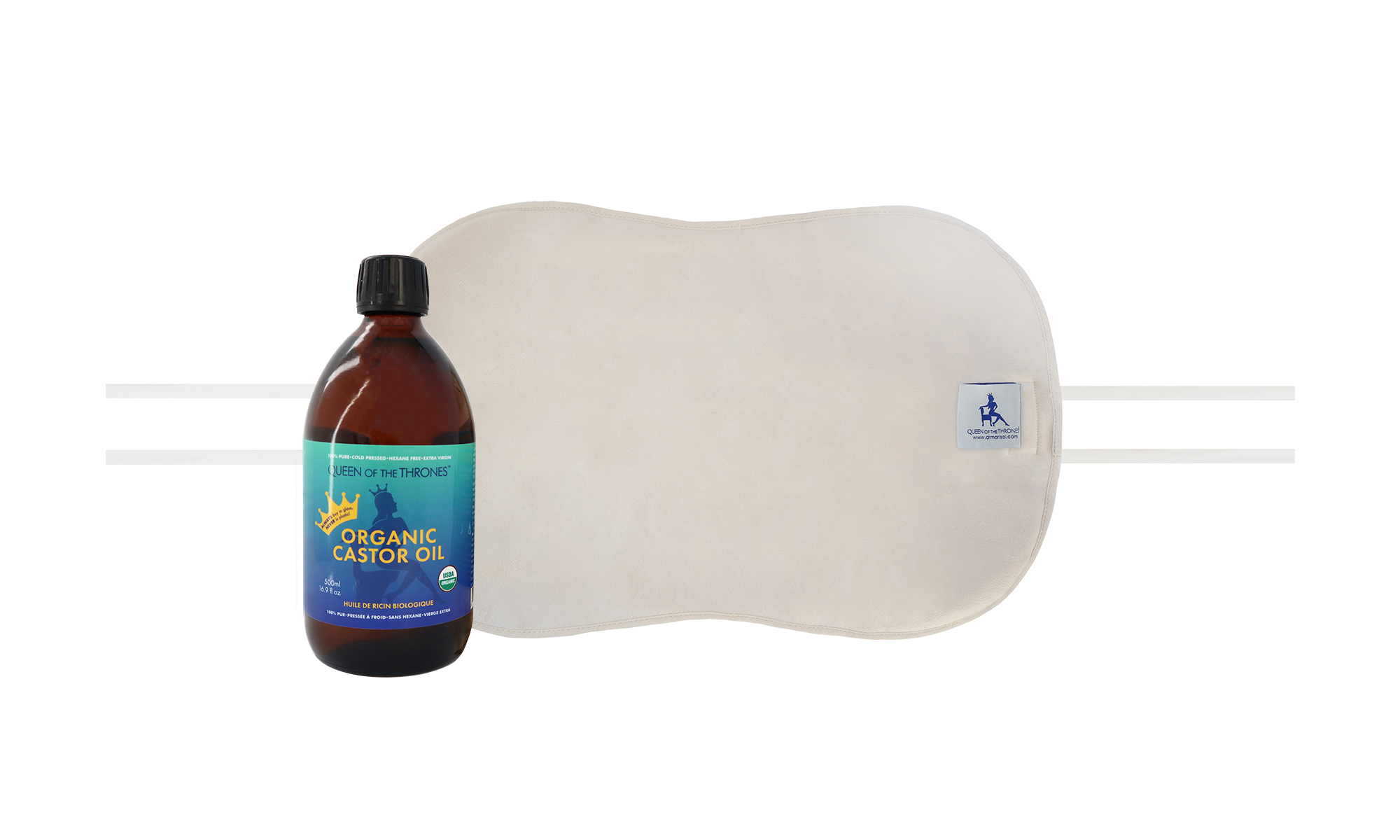
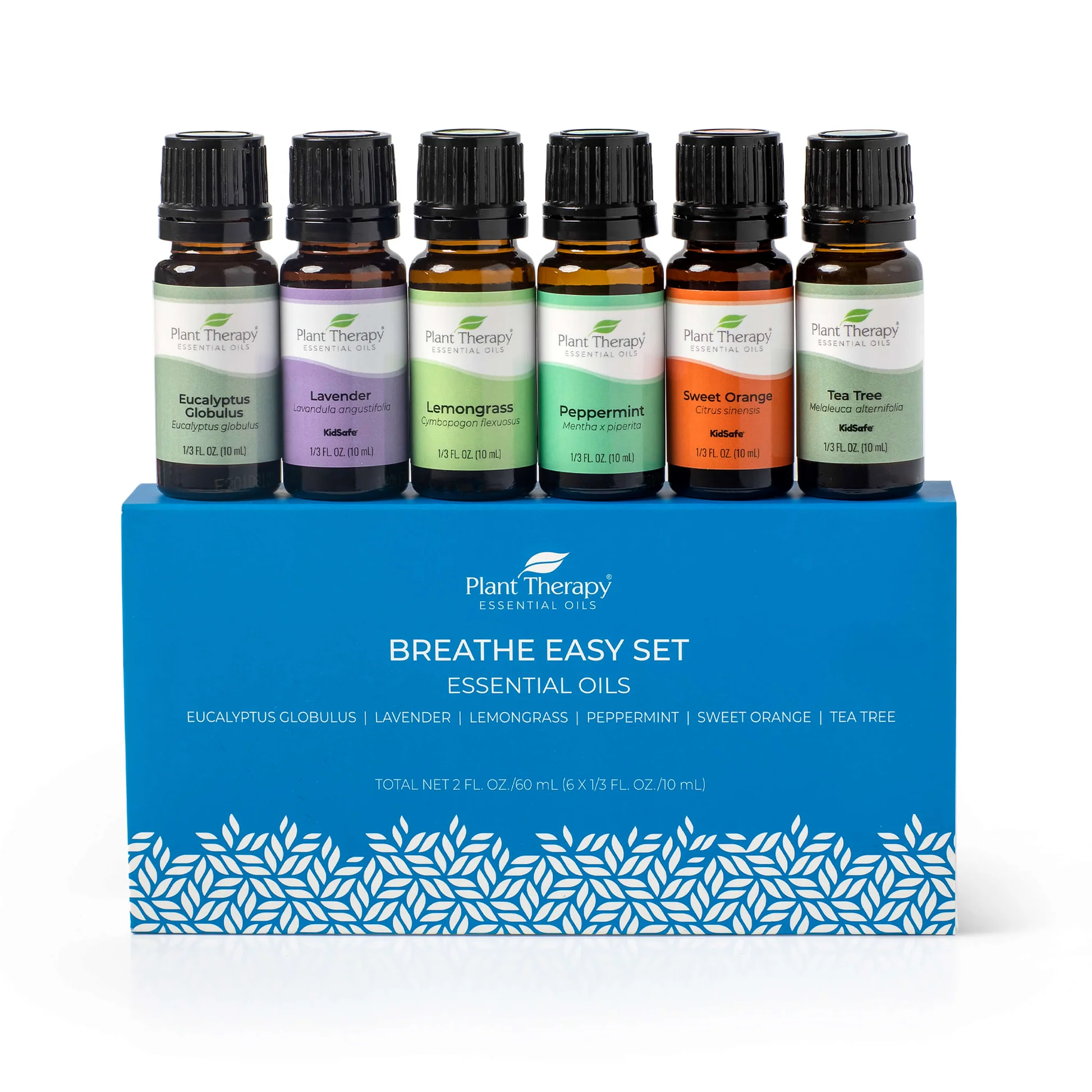


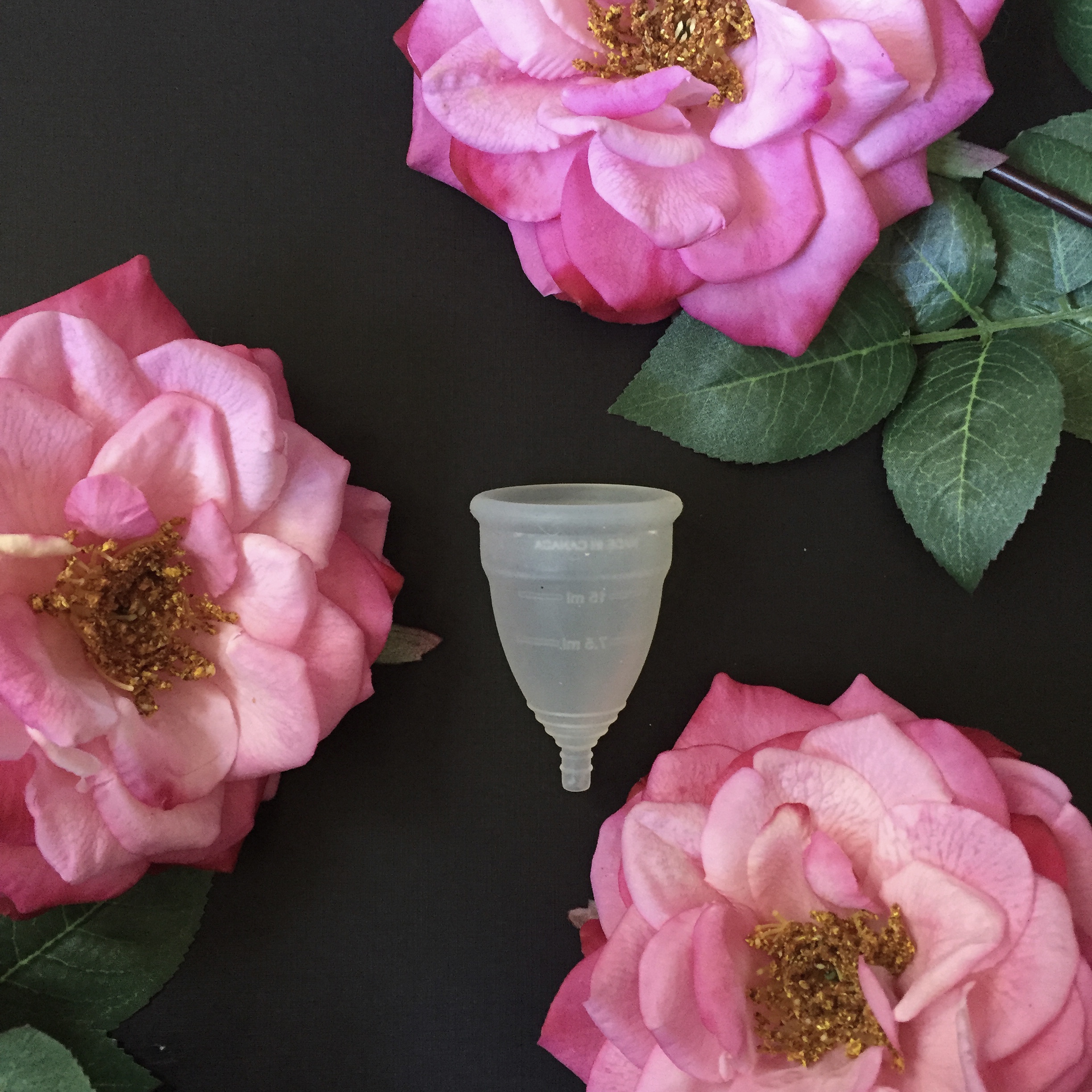
No Comments